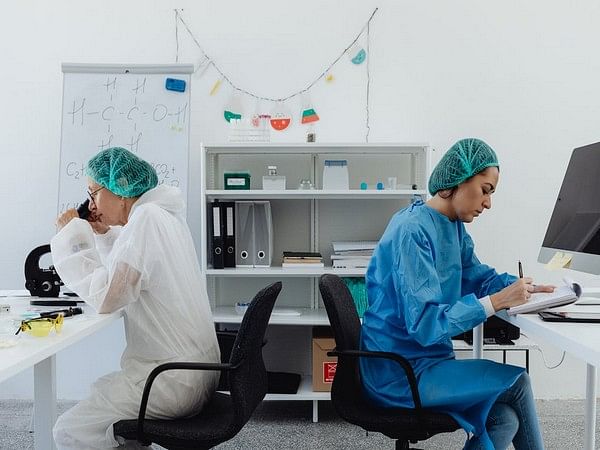Cambridge [UK], April 25 (ANI): Breast cancer survivors have a much greater chance of having secondary cancers, including endometrial and ovarian cancer for women and prostate cancer for men, according to new research based on data from almost 600,000 patients in England.
For the first time, researchers discovered that this risk is larger in persons living in areas with higher socioeconomic disadvantage.
Breast cancer is the most commonly diagnosed cancer in the UK. Around 56,000 people in the UK are diagnosed each year, the vast majority (over 99 per cent) of whom are women. Improvements in earlier diagnosis and in treatments mean that five year survival rates have been increasing over time, reaching 87 per cent by 2017 in England.
People who survive breast cancer are at risk of second primary cancer, but until now the exact risk has been unclear. Previously published research suggested that women and men who survive breast cancer are at a 24 per cent and 27 per cent greater risk of a non-breast second primary cancer than the wider population respectively. There have been also suggestions that second primary cancer risks differ by the age at breast cancer diagnosis.
To provide more accurate estimates, a team led by researchers at the University of Cambridge analysed data from over 580,000 female and over 3,500 male breast cancer survivors diagnosed between 1995 and 2019 using the National Cancer Registration Dataset. The results of their analysis are published today in Lancet Regional Health – Europe.
First author Isaac Allen from the Department of Public Health and Primary Care at the University of Cambridge said: “It’s important for us to understand to what extent having one type of cancer puts you at risk of a second cancer at a different site. The female and male breast cancer survivors whose data we studied were at increased risk of a number of second cancers. Knowing this can help inform conversations with their care teams to look out for signs of potential new cancers.”
The researchers found significantly increased risks of cancer in the contralateral (that is, unaffected) breast and for endometrium and prostate cancer in females and males, respectively. Females who survived breast cancer were at double the risk of contralateral breast cancer compared to the general population and at 87 per cent greater risk of endometrial cancer, 58 per cent greater risk of myeloid leukaemia and 25 per cent greater risk of ovarian cancer.
Age of diagnosis was important, too – females diagnosed with breast cancer under the age of 50 were 86 per cent more likely to develop a second primary cancer compared to the general population of the same age, whereas women diagnosed after age 50 were at a 17 per cent increased risk. One potential explanation is that a larger number of younger breast cancer survivors may have inherited genetic alterations that increase risk for multiple cancers. For example, women with inherited changes to the BRCA1 and BRCA2 genes are at increased risk of contralateral breast cancer, ovarian and pancreatic cancer.
Females from the most socioeconomically deprived backgrounds were at 35 per cent greater risk of a second primary cancer compared to females from the least deprived backgrounds. These differences were primarily driven by non-breast cancer risks, particularly for lung, kidney, head and neck, bladder, oesophageal and stomach cancers. This may be because smoking, obesity, and alcohol consumption – established risk factors for these cancers – are more common among more deprived groups.
Allen, a PhD student at Clare Hall, added: “This is further evidence of the health inequalities that people from more deprived backgrounds experience. We need to fully understand why they are at greater risk of second cancers so that we can intervene and reduce this risk.”
Male breast cancer survivors were 55 times more likely than the general male population to develop contralateral breast cancer – though the researchers stress that an individual’s risk was still very low. For example, for every 100 men diagnosed with breast cancer at age 50 or over, about three developed contralateral breast cancer during a 25 year period. Male breast cancer survivors were also 58% more likely than the general male population to develop prostate cancer.
Professor Antonis Antoniou from the Department of Public Health and Primary Care at the University of Cambridge, the study’s senior author, said: “This is the largest study to date to look at the risk in breast cancer survivors of developing a second cancer. We were able to carry this out and calculate more accurate estimates because of the outstanding data sets available to researchers through the NHS.”
The research was funded by Cancer Research UK with support from the National Institute for Health and Care Research Cambridge Biomedical Research Centre.
Cancer Research UK’s senior cancer intelligence manager, Katrina Brown, said: “This study shows us that the risk of second primary cancers is higher in people who have had breast cancer, and this can differ depending on someone’s socioeconomic background. But more research is needed to understand what is driving this difference and how to tackle these health inequalities.” (ANI)
This report is auto-generated from ANI news service. ThePrint holds no responsibility for its content.



